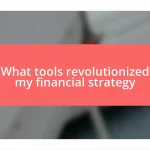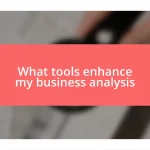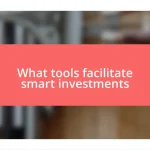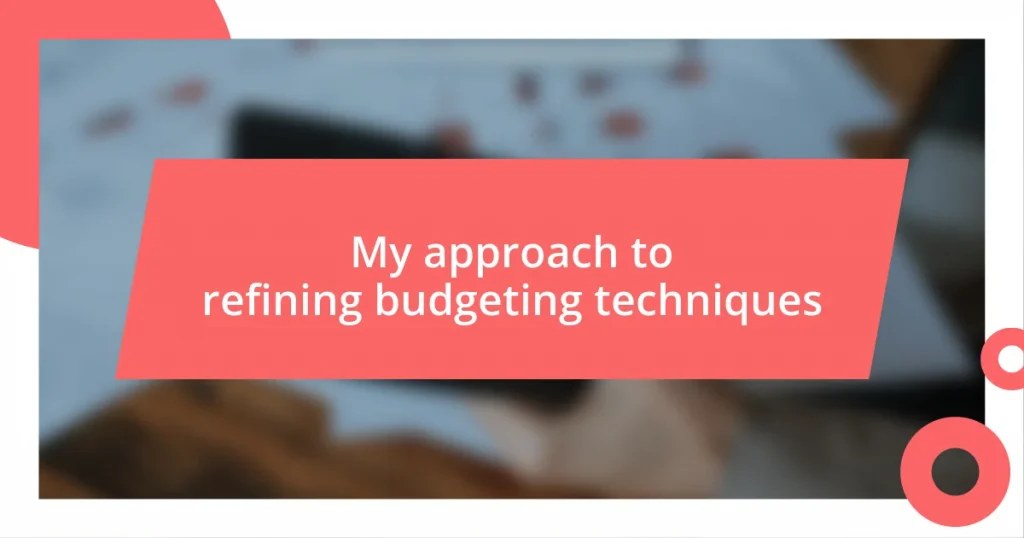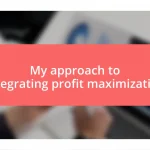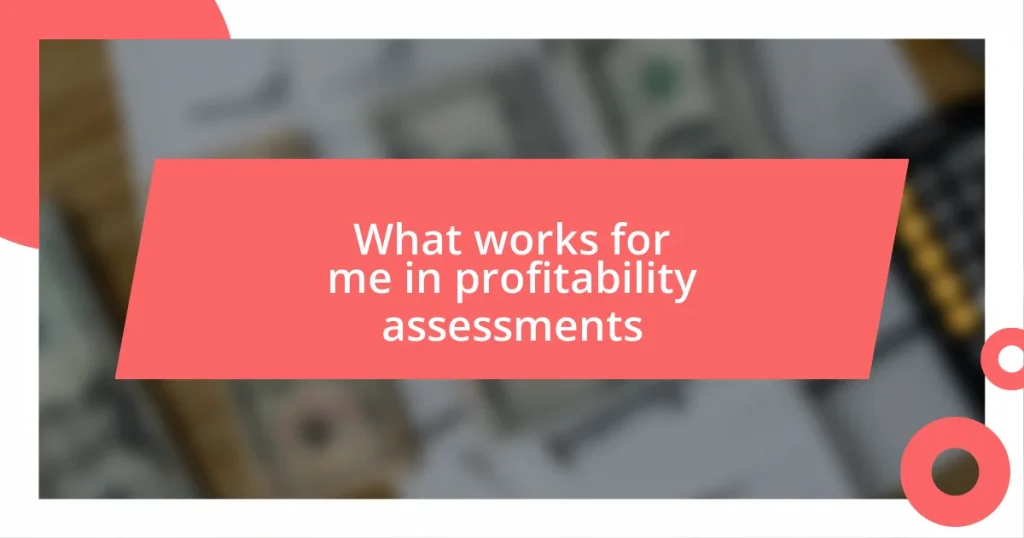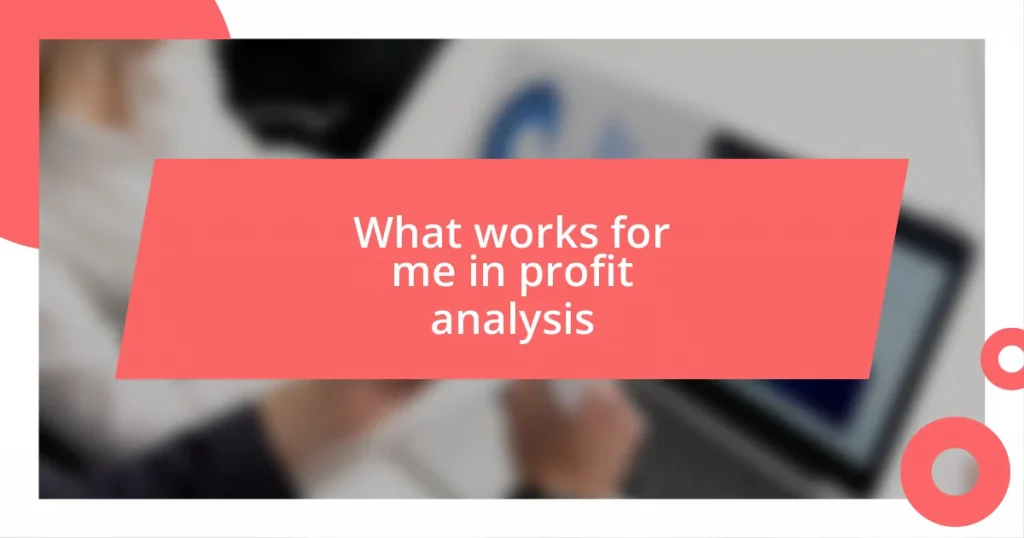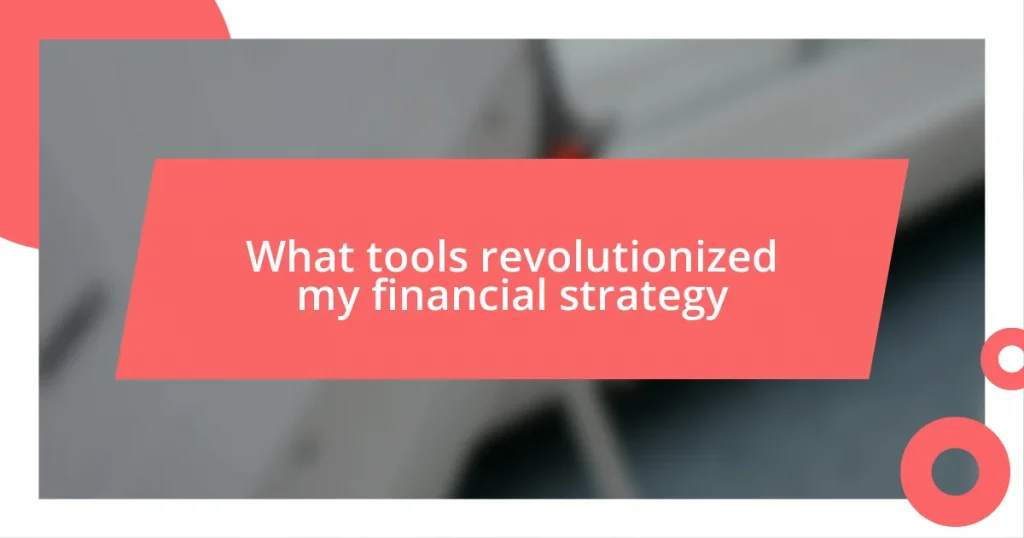Key takeaways:
- Understanding budgeting involves recognizing fixed and variable expenses to prevent overspending and achieve financial goals.
- Embracing flexibility in budgeting allows adjustments for unforeseen expenses, maintaining motivation and aligning the budget with personal life changes.
- Leveraging technology enhances budgeting efficiency through real-time tracking, automation, and clearer visibility into spending habits.
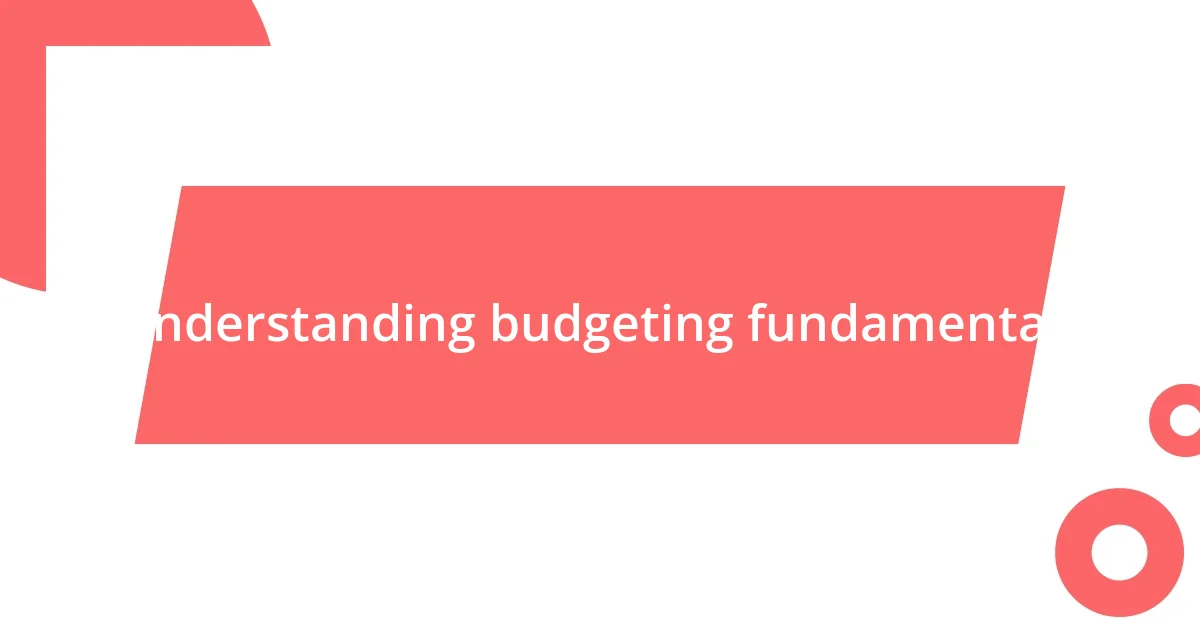
Understanding budgeting fundamentals
Budgeting is more than just tracking expenses; it’s about understanding your values and priorities. When I first started budgeting, I was surprised by how my spending patterns revealed what truly mattered to me. Have you ever thought about what your budget says about your lifestyle choices?
A solid grasp of budgeting fundamentals requires awareness of both fixed and variable expenses. Fixed expenses, like rent or mortgage, are predictable, while variable expenses can vary month to month. Early on, I learned the hard way that neglecting to categorize these expenses led to overspending in areas I hadn’t considered. It’s a common pitfall, isn’t it?
One essential tool I discovered was the zero-based budgeting method, where every dollar has a purpose. At first, it felt tedious, but I found it empowering to allocate funds intentionally and witness my savings grow. Have you ever experienced that thrill of seeing your budget align with your financial goals? It’s a game changer!
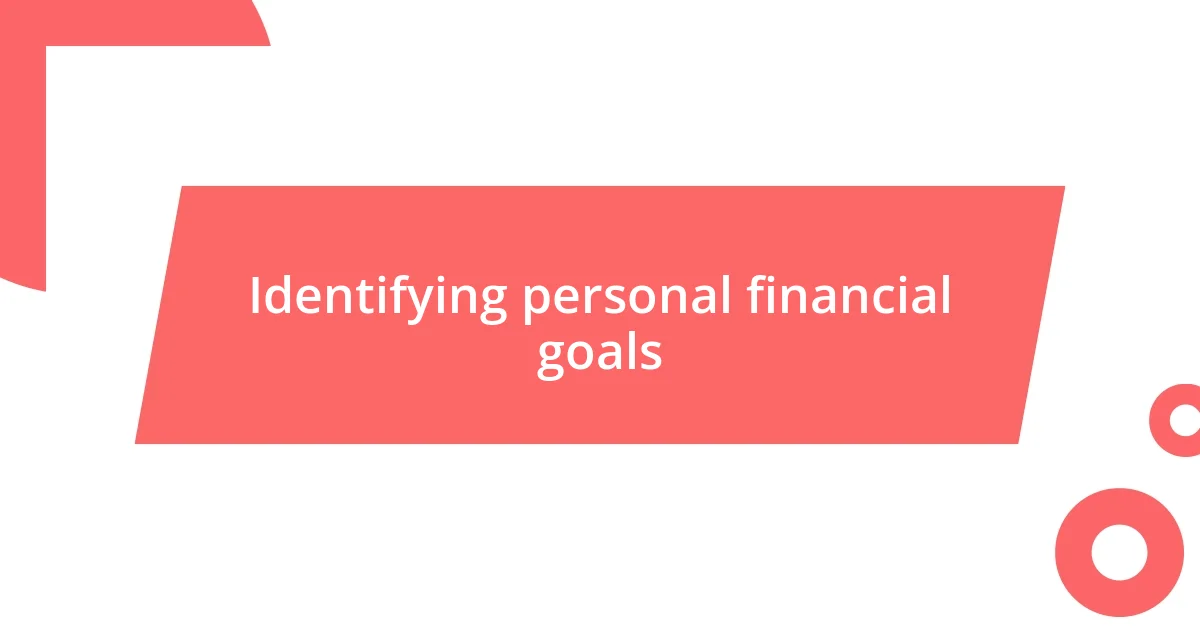
Identifying personal financial goals
Identifying personal financial goals is a critical step in refining your budgeting techniques. I remember when I first got serious about my finances; I sat down with a notebook and wrote down my short-term and long-term goals. This exercise wasn’t just about numbers; it was incredibly empowering to outline what I wanted to achieve, whether it was saving for a vacation or setting aside funds for retirement. Have you taken the time to pinpoint what financial success looks like for you?
As I delved deeper, I realized that understanding my motivations behind these goals made them more meaningful. For instance, I didn’t just want to save for a new car; I wanted the freedom to explore new places on the weekends. This understanding added a layer of urgency and importance to my saving efforts. Have you discovered the underlying reasons for your financial aspirations?
Creating a vision board became my favorite strategy. I gathered images and words that resonated with my financial goals and placed them where I could see them daily. The visual reminder kept me focused, helping me resist spontaneous purchases that would derail my progress. How do you keep your financial goals in sight?
| Short-Term Goals | Long-Term Goals |
|---|---|
| Save for a vacation | Retirement savings |
| Pay off credit card debt | Invest in a home |
| Build an emergency fund | Children’s education fund |
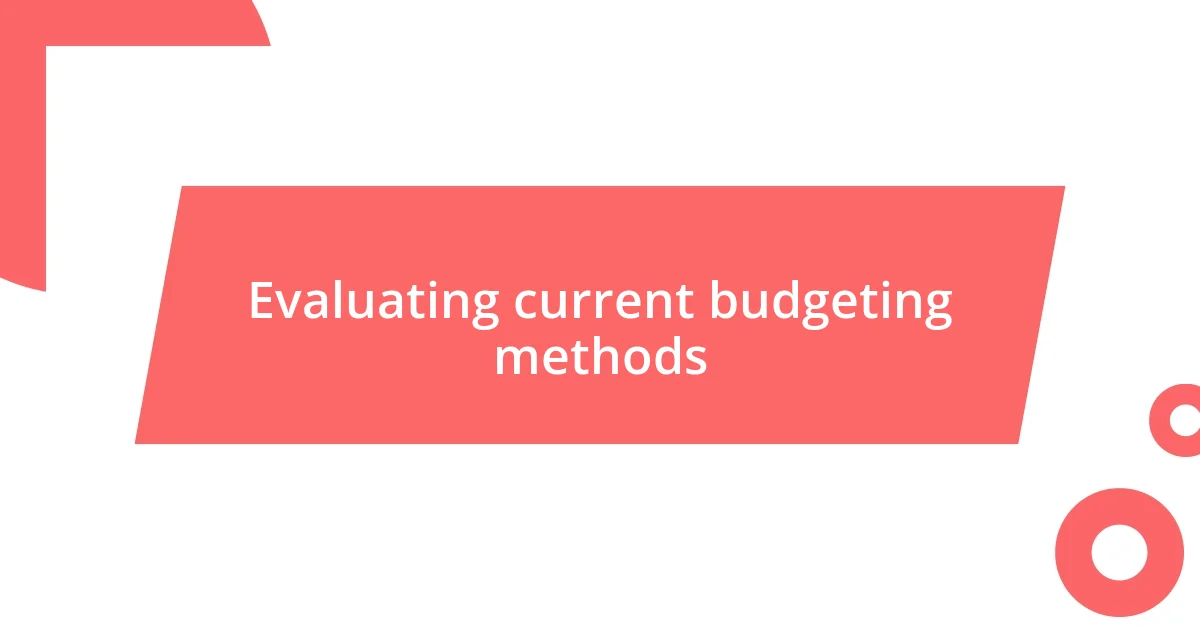
Evaluating current budgeting methods
Evaluating my current budgeting methods has been both revealing and invigorating. I distinctly remember the moment when I took a step back to assess how my existing techniques were performing. Were they helping me achieve my goals, or were they simply a source of stress? This reflection was crucial; it allowed me to identify methods that felt constricting versus those that sparked joy.
To better understand the effectiveness of my budgeting techniques, I considered these aspects:
- Clarity: Do I clearly see where my money goes each month?
- Flexibility: Can I easily adjust my budget for unforeseen expenses?
- Motivation: Does my budgeting method inspire me to stick to my financial goals?
- Success Tracking: Am I able to track my progress toward my financial milestones?
I realized not every method suits everyone’s lifestyle. As I dove deeper, I took the opportunity to test different approaches, like using apps for tracking versus sticking to spreadsheets. Each method had its pros and cons, which made fine-tuning my budget an enlightening journey.
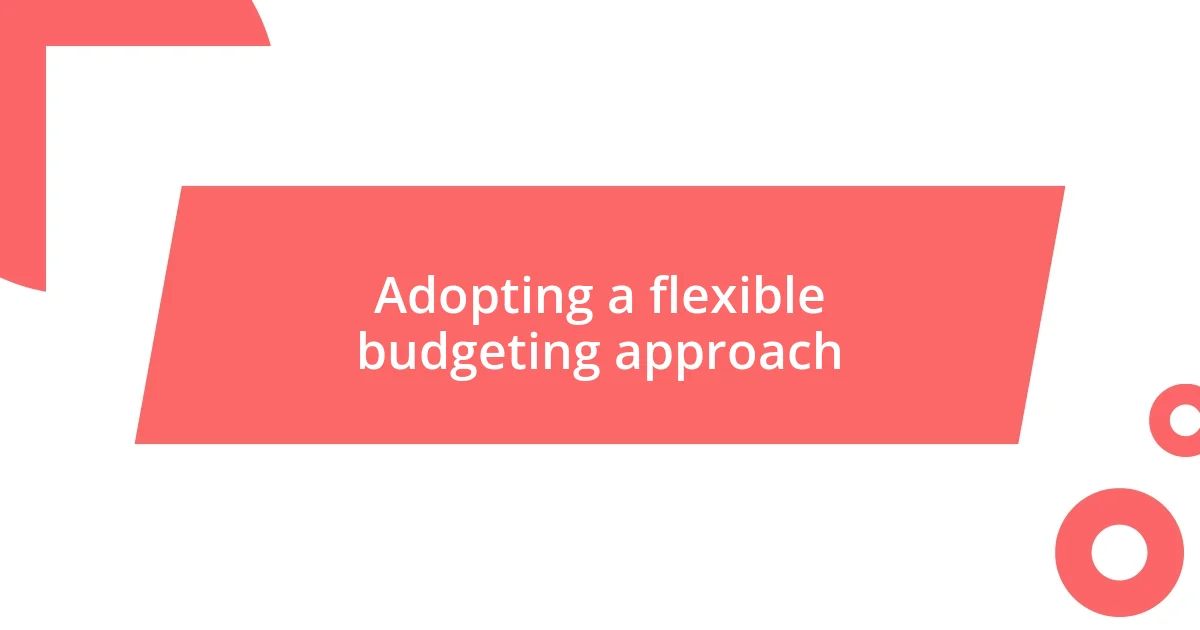
Adopting a flexible budgeting approach
Embracing a flexible budgeting approach has been a game changer for me. I vividly recall a time when a sudden car repair threatened to throw my entire month off-track. Instead of panicking, I adjusted my budget by reallocating funds from a less urgent category. This experience taught me that life is unpredictable, and having a flexible budget allows me to respond without derailing my goals. Have you ever faced unexpected expenses that made you reconsider your budgeting strategy?
Flexibility in budgeting isn’t just about adjusting numbers; it’s about fostering a mindset that encourages adaptability. I used to adhere strictly to my budget categories, which often left me feeling restricted. However, I started to view my budget more as a living document, evolving with my priorities and changes in circumstances. By allowing room for adjustments, I found that I could be creative with my expenses without guilt. What shifts in your mindset could help you embrace flexibility?
Ultimately, I’ve learned that flexible budgeting also helps me maintain my motivation. When my budget feels rigid, it can be discouraging, especially when challenges arise. By incorporating flexibility, I find it easier to celebrate small wins, like successfully saving funds for that long-desired trip, even while making necessary adjustments. How does flexibility impact your motivation to stick to your financial goals?
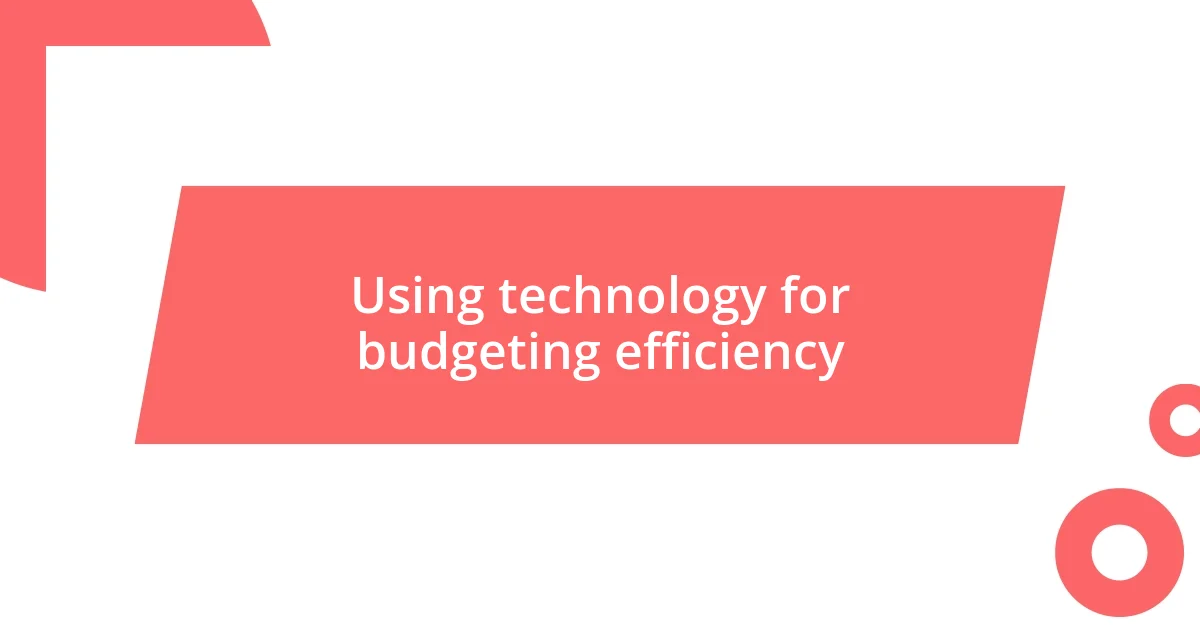
Using technology for budgeting efficiency
Using technology to enhance my budgeting efficiency has transformed the way I manage my finances. I remember the first time I downloaded a budgeting app; it was almost magical to see my spending categorized automatically. Suddenly, I had a clearer picture of where my dollars were going. Have you ever felt overwhelmed with numbers? Technology takes that burden off my shoulders, allowing me to focus on strategies rather than just calculations.
I’ve also found comfort in the automation features of these apps. Setting up recurring payments or savings transfers has taken the worry out of my budgeting routine. For instance, I set aside money for my savings goals without even thinking about it. This small step contributed significantly to my financial health. What if technology could help you create a ripple effect of saving effortlessly?
Ultimately, real-time tracking has given me a sense of empowerment. I can monitor my spending as it happens, making corrections on the fly. The other day, I noticed I’d been spending more on dining out than planned. Thanks to my app, I quickly redirected funds and made adjustments for the rest of the month. Isn’t it reassuring to have that level of control? Leveraging technology not only enhances my budgeting efficiency but also nurtures a proactive approach to my financial well-being.
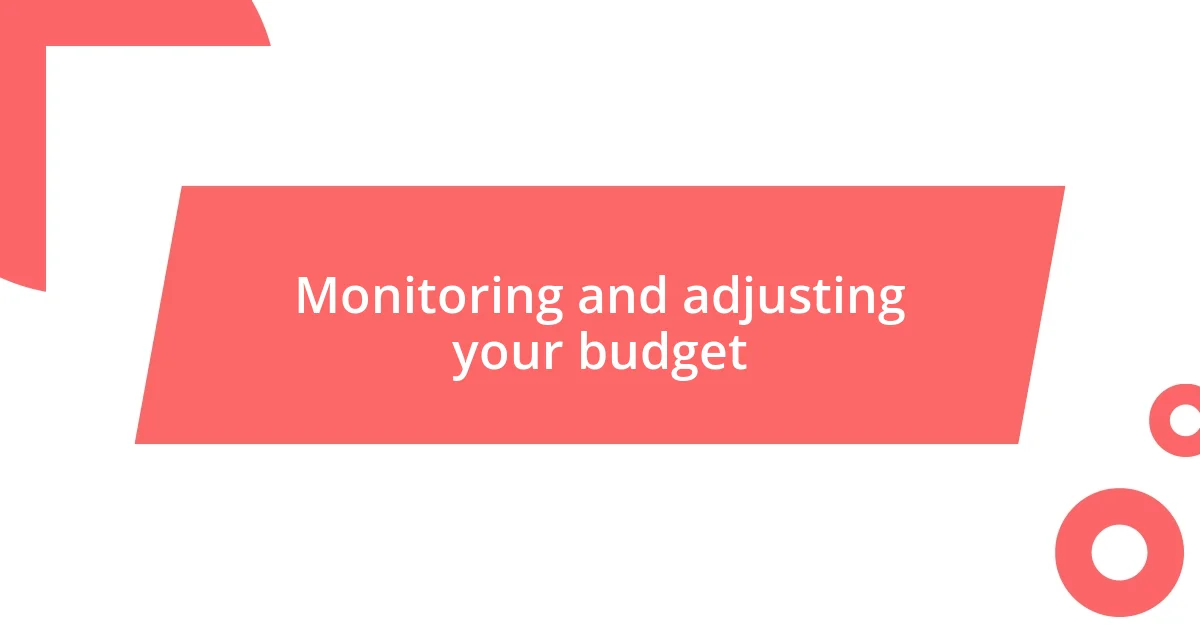
Monitoring and adjusting your budget
Keeping an eye on my budget has become an essential part of my financial journey. I remember a time when I let my spending run unchecked for a couple of weeks, only to discover I’d overspent in multiple categories. That bit of panic as I realized I was over budget? It motivated me to adopt a regular monitoring routine. Now, I set aside a few minutes each week to review my expenses, and it feels empowering to catch potential slip-ups early.
Adjusting the budget means not only realigning numbers but also reflecting on my spending habits. Recently, I realized I was spending way too much on subscriptions that I hardly used. It was a small wake-up call that led me to reconsider what I actually valued. This ongoing process of evaluation has taught me that budgeting is less about deprivation and more about prioritizing what truly matters to me. Have you ever identified hidden expenses that could be better utilized?
Making adjustments can feel daunting, but I’ve found it surprisingly liberating. When something unexpected comes up—like a friend’s wedding—I don’t hesitate to tweak my budget to accommodate that joy. Previously, I’d stress over whether I could afford it, but now, adjustments feel like an opportunity to make my budget more aligned with my current life. How often do you think about your budget in terms of opportunity rather than limitation? Embracing this mindset allows me to move forward with my financial goals while still enjoying life’s moments.


